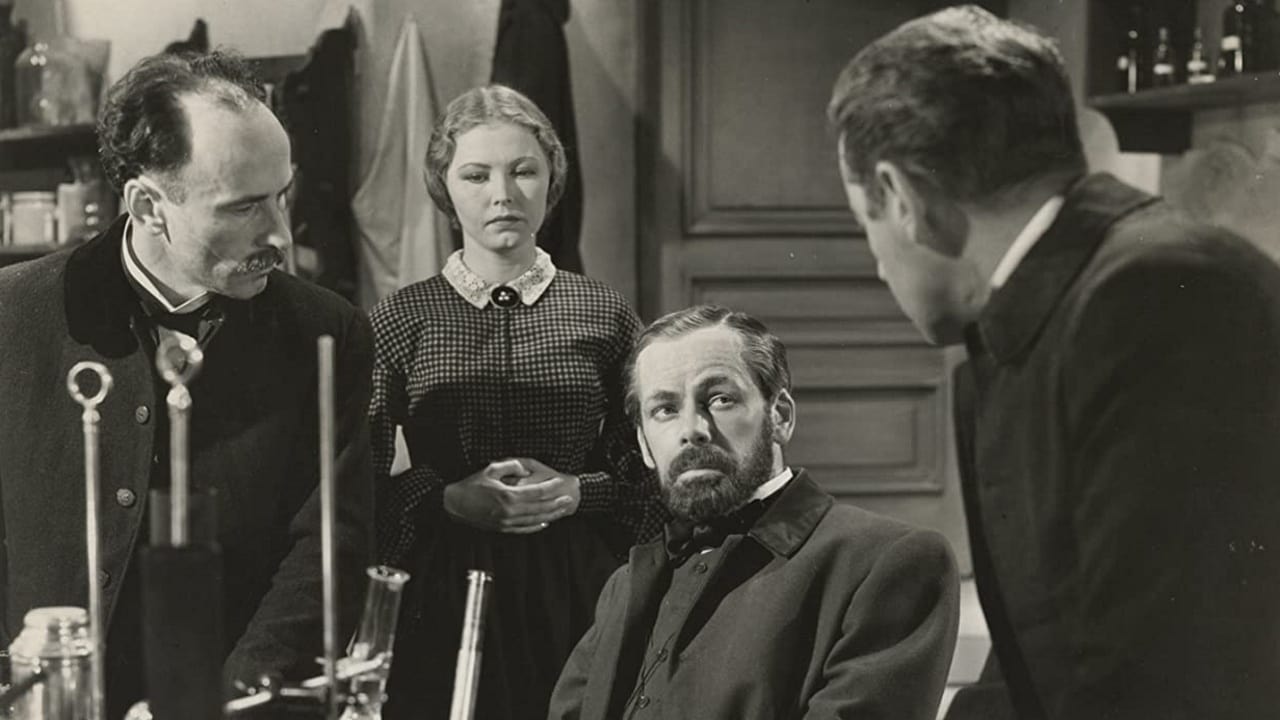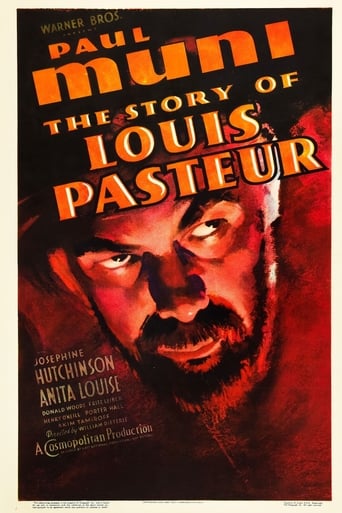

That was an excellent one.
... View MoreOverrated
... View MoreCharming and brutal
... View MoreAm I Missing Something?
... View MoreAfter several decades of hearing about this film, I finally saw it on a certain video service. I have always been an admirer of Muni, and I am glad that he finally received an Academy Award for Best Actor. BUT, his performance seems a bit forced at times here. British film critic David Thomson complains that Muni began overacting in the mid-1930s, and I would have to agree in small part with that assessment. To be fair, Muni does provide some commendable gravitas as Pasteur, and his award did come after his powerful performances in earlier films, such as the previous year's BLACK FURY (he placed second to Victor McLaglen in the 1935 Academy Award voting as a write-in candidate for that film.) But let's say that Muni delivers more impressively in the next year's LIFE OF EMILE ZOLA.As for the film, one must keep in mind that this became an early example of what quickly became a cliché in mainstream Hollywood cinema--the "neglected genius overcomes all obstacles." The script is usually excellent, and the directing and supporting performances are not bad. But I still feel that the material is somewhat dated, if interesting.
... View MorePAUL MUNI gives an eloquent performance as Louis Pasteur in this abbreviated biography of his life which never has time to mention some of his other achievements, such as pasteurized milk. Instead, it concentrates on the difficulties he has of convincing any of the medical experts that microbes are the cause of disease. His experiments with finding a cure for anthrax and rabies are at the centerpiece of the story.JOSEPHINE HUTCHINSON is his devoted and loyal wife who has to remind him to eat dinner when he's caught up in his experiments with animals to prove his theories. ANITA LOUIS and DONALD WOODS provide what little romantic interest there is in the tale, strictly cardboard characters little more than ciphers.Muni ages convincingly without the use of heavy make-up and won a Best Actor Oscar for his detailed performance. HALLIWELL HOBBES as Dr. Lister, AKIM TAMIROFF as Dr. Zaranoff, PORTER HALL as Dr. Rossignol, and FRITZ LEIBER as his nemesis, Dr. Charbonnet, are excellent in supporting roles.Nicely directed by William Dieterle.
... View MoreApparently none of the previous reviewers,most of whom praise the film for its accuracy, have actually read a biography of Louis Pasteur.The most glaring inaccuracy is in the relationship between Pasteur and Napoleon III.Back in the 1930's the latter was invariably shown in a bad light.While far from an admirable character-he was an inept politician and a self-appointed "military genius" who allowed France to be dragged into a disastrous war,he was not the stupid reactionary depicted here. He had an intelligent interest in science,and like many other people in the 19th century saw a bright future because of the improvements it would bring.Far from exiling Pasteur, he was his PATRON,building him a laboratory and providing him with all the resources that he needed for his research.While the lab was under construction, Pasteur became gravely ill.A bureaucrat, deciding it was a waste of money to build a laboratory for someone who would soon be dead, ordered work halted on his own authority.When the emperor heard about this, his outrage shook the bureaucracy so that there was a flurry of buck-passing, and work promptly resumed.The Emperor personally visited Pasteur to comfort him and reassure him that he would get his lab.The emperor would often bring members of his court to admire Pasteur's projects,and it was obvious to everyone that Pasteur was one of the emperor's favorites.Pasteur's main worry concerning the Emperor was that Napoleon thought Pasteur was virtually a miracle worker who could do almost anything, and was constantly assigning him tasks outside of his previous experience.Pasteur, a very modest man, was always protesting this, but Napoleon would say that he had complete faith in him,and Pasteur despite his misgivings, always came through.They always had a close and friendly relationship,and after the Emperor was overthrown, Pasteur refused to say a bad word about him,grateful to the end of his life.The part about his daughter having the baby, and Pasteur sacrificing his principles to get a doctor, never happened.The part about the anthrax and rabies, for which he was famous, is generally correct, but the notion that the anthrax experiment raised him from obscurity to fame is false.He was famous and respected at the time this happened.This movie is OK from a dramatic standpoint,but very distorted as biography.
... View MoreWhile the actual details of the life of the great chemist, Louis Pasteur, are mixed up in this glossy MGM biography, the general facts are all there and the film is both captivating and inspiring. In many ways, the movie DR. EHRLICH'S MAGIC BULLET (starring Edward G. Robinson) is Warner Brother's answer to this MGM film and BOTH are well worth seeing and are about equally entertaining.Paul Muni plays Pasteur, though much of his earlier career is left out of the film. Instead of his many advances and breakthroughs, the film focuses on three--his sterilization crusade, his inoculation for Anthrax and his cure for Rabies. This is probably not a bad idea, since the film never would have fit into the a standard length otherwise.I also assume that some of the characters in the film were fictitious, as I tried doing an internet search on Dr. Charbonnet as well as read up on Pasteur and could not verify some of the film's details--this isn't at all unusual for a bio-pic from the 1930s plus none of this fundamentally changed the overall facts.The film is well-written, compelling and makes science kind of cool. So, if you want to expose kids to culture and science, this is a good and relatively painless way to do it.By the way, the actor that played Joseph Lister is pretty much dead-on to the real Lister--right down to the muttonchops!
... View More